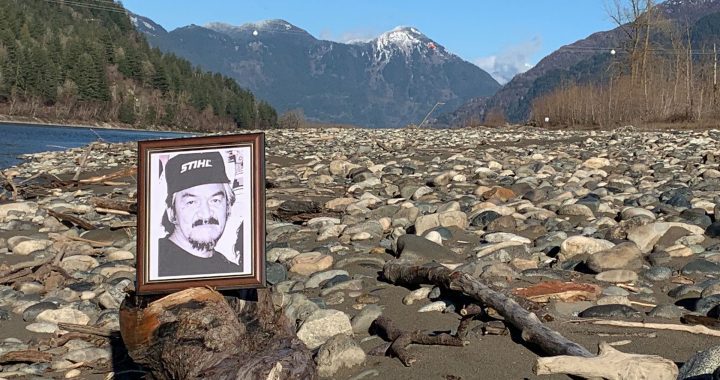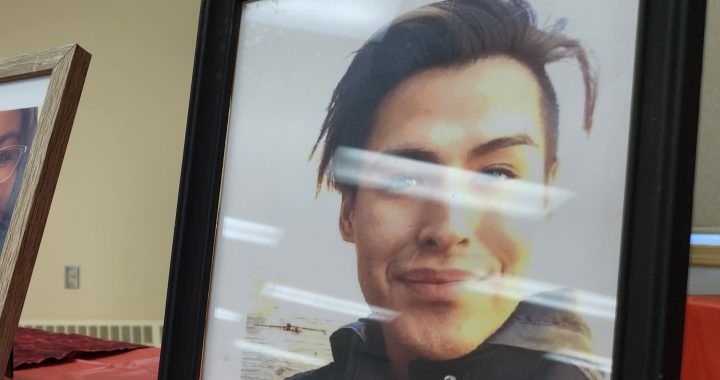(left to right): Donna Rogers-Necan, Thelma Fair and Darlene Necan protesting outside Kenora lawyer Doug Keshen’s office in June, 2014.
Photo courtesy Darlene Necan
By Kathleen Martens
APTN Investigates
WINNIPEG – A residential school survivor is on a hunger strike to force his band to sever ties with its law firm.
Garnet Angeconeb, 57, says he stopped eating and drinking Thursday morning to force Lac Seul First Nation to sever ties with Keshen & Major of Kenora, Ont.
The law firm has been the band’s legal advisors for more than 30 years but is now under investigation for its handling of residential school survivors compensation claims, as APTN Investigates reported earlier this week.
“I’m not on a suicide mission,” Angeconeb told APTN. “I’m an optimist.”
Angecomb was in high spirits Friday morning, saying he felt only a little tired. Along with refusing food, Angecomb is declining to take his medication for a musculo-degenerative disease and diabetes that have put him in a wheelchair. He says he is willing to risk his health, and ultimately his life, to put survivors before lawyers.
The band, under Chief Clifford Bull, passed a “watered-down” resolution to that effect on August 25, Angeconeb said.
“I wanted them to sever all ties with the firm, its lawyers, its agents and associates. Instead it agreed to cut out (Doug) Keshen,” Angeconeb explained, “but not Will Major.”
A copy of both resolutions – obtained by APTN – confirms that. The documents also show the council held a special meeting to hear from survivors and reconsider its professional relationship with the firm.
Chief and council agreed the allegations against Keshen & Major were upsetting, especially since the firm was a signatory to the 2006 Indian Residential Schools Settlement Agreement (IRSSA).
It was survivors from the band that alerted officials to extra fees and high-interest loans the firm was allegedly charging against their residential schools compensation awards under the Independent Assessment Process (IAP). The IAP was negotiated as part of IRSSA.
“Survivors who have filed compensation claims under [IRSSA] have done so with brave and courageous hearts,” Lac Seul council stated in its resolution. “The alleged actions of Douglas Keshen may have further burdened certain survivors with more unnecessary pain.
“Therefore be it resolved that, in light of these serious allegations made against Douglas Keshen, the chief and council leadership of Lac Seul First Nation cannot in good conscience continue to utilize the professional services of Douglas Keshen while the IRSSA investigation is underway.”
A call to Keshen’s office seeking comment for this story was not immediately returned. The company’s website says the firm focuses on Aboriginal law in northwestern Ontario, noting Keshen and Major “have acted on behalf of First Nations and Aboriginal individuals, organizations, corporations and institutions in claims involving Aboriginal rights, lands, natural resources, as well as various business opportunities and transactions.”
The investigation of its IAP files was approved by an Ontario Superior court judge earlier this month. His order gives Crawford Class Action Services the power to review the work of Keshen and his firm.
Crawford is specifically looking into survivors’ complaints they were charged administrative fees for loans and received cash advances charged against their IAP funds, and dinged as much as 29.95 per cent interest on personal loans, leaving them with very little compensation money. Some allege Keshen prepared wills, arranged for them to buy home appliances and hooked them up with third-party loan companies for extra charges he took off their awards.
Those fees were allegedly in addition to the 15 per cent legal fee lawyers earn for completing the compensation cases.
An affidavit from one investigator, shows a Keshen client was expecting $190,000 in compensation and received $48, 166.12 instead. That document also alleges a survivor was charged $7,200 after the Keshen firm corresponded “with third parties who were issued monies from that Keshen claimant’s account.”
Keshen told APTN he did arrange loans for some of his 246 claimants to lessen their stress. He says they were angry and frustrated with how long they had to wait for their IAP funds.
But collecting third-party costs and additional fees from IAP awards is prohibited under the IRSSA, and the Financial Administration Act.
Survivors’ concerns went public this summer when three women protested outside the Keshen & Major offices in Kenora. They were residential school survivors from Lac Seul who marched and waved signs encouraging motorists to honk their horns in support.










